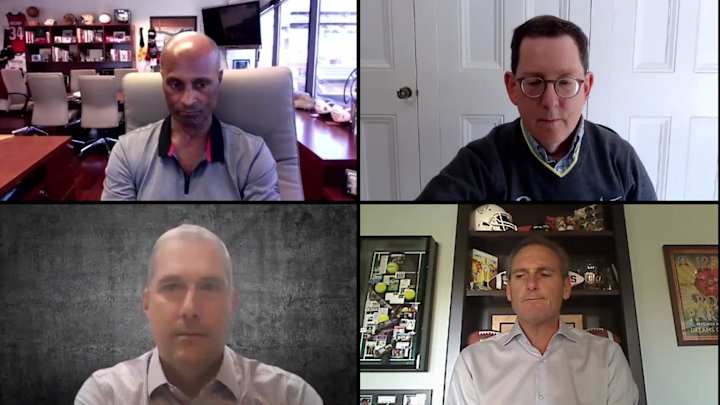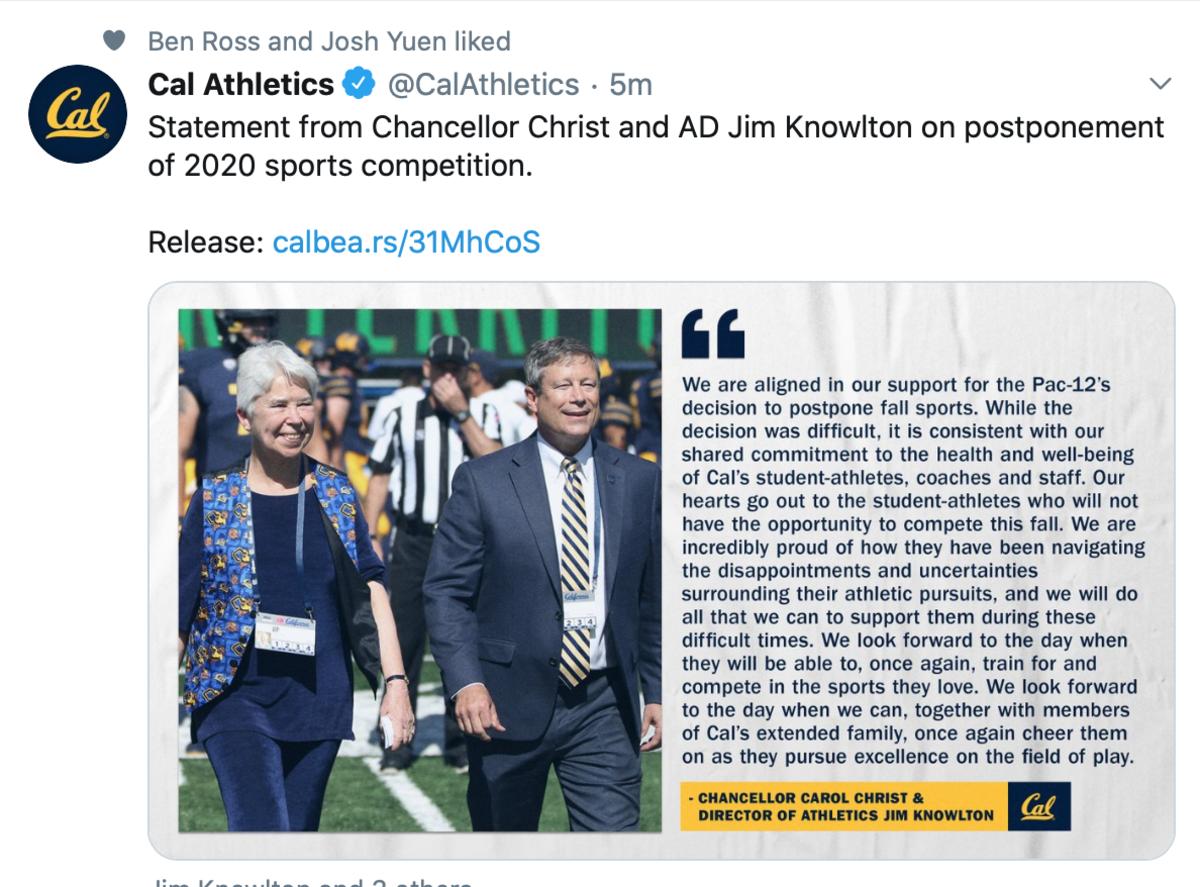The Pac-12 Cancels Fall Football: The Details and the Questions Still Looming

The news Pac-12 football fans dreaded officially arrived on Tuesday when the conference announced it has canceled all fall sports competition, with a return date no sooner than Jan. 1.
Cal will not open its season on Sept. 26 at Oregon State. If and when that game is rescheduled remains uncertain, and depends on the state of the COVID-19 pandemic.
For the Bears, this will be first year without football since 1889 -- 131 years ago -- when the season was canceled reportedly due to excessive rains.
The decision was finalized at a morning meeting of the Pac-12 CEOs — university presidents and chancellors — after months of discussions by a range of groups but always guided by medical and science input.
The Big Ten Conference, Cal's traditional partner in the Rose Bowl, also announced Tuesday it has canceled football this fall. There was no immediate word from the SEC, ACC or Big 12.
Pac-12 commissioner Larry Scott, on a webinar with reporters, called it “an extremely difficult and painful decision we know will have important impacts on our student-athletes, coaches, administrators and our fans. And we know that nothing we can say will ease some of that disappointment.”
*** Here is a link to the full 45-minute webinar.

Cal coach Justin Wilcox provided his thoughts in a statement released by the athletic department:
"The COVID-19 pandemic has obviously put all of us in an incredibly difficult and complex situation. I am disappointed for our student-athletes that there will not be a Pac-12 football season this fall. They have had a great attitude through all of this uncertainty. But our ultimate responsibility is to keep everyone involved in our program as healthy and safe as possible. We have listened to and been guided by the advice of our health experts throughout this process, and our presidents and chancellors have had to make difficult decisions. Even though there will not be Pac-12 football games this fall, we must continue to help our student-athletes remain healthy and safe, and we look forward to playing football when we are given the green light to do so.”
Likewise, Cal chancellor Carol Christ athletic director Jim Knowlton provided this joint statement:

Here is Cal quarterback Chase Garbers' reaction:

Senior cornerback Camryn Bynum offered this response:
"To say the least, I am extremely saddened by the news of our college football season being postponed. I love the game more than anything and would love to play ball as soon as possible, but with everything going on, it is out of my control. As we are all hit hard by the news, we will stay positive and be grateful that we are in good health and want to keep it that way as we are temporarily away from the game that we love. In the meantime, we will continue to put in work to be the best versions of ourselves we can be for whatever comes next. Thank you and God bless. Cambeezy."
Oregon president Michael Schill, who labeled the past few months “a nightmare,” told reporters combination of factors led the Pac-12 to its decision: the continued spread of the virus, local government health restrictions and a growing concern over myocarditis, a serious heart condition that can afflict young athletes.
“We are science based. We are academics. We are going to be looking at facts, not just opinions,” Schill said. “At the same time, we fully understand this has tremendous human impacts. We have students whose dream it was to play this year. And that dream, at least this fall, not not going to happen.”
Cal senior cornerback Camryn Bynum said Monday he wants to play and was “willing to risk” the virus concerns. Other players across the country feel the same way, including star quarterbacks Trevor Lawrence of Clemson and Justin Fields of Ohio State.
Arizona State athletic director Ray Anderson, asked if the conference considered a path where players would sign a waiver to take schools off the hook, said, “Our responsibility is not about liability, our responsibility is about accountability. We’re not driven by lawyers who say we’ll relieve you of liability. That’s not what floats the boat in this conference.”
Oregon State’s Dr. Doug Aukerman, chair of the Pac-12 Medical Advisory Committee, said it’s simply unclear what the long-term effects of the virus might be. And he added, “It’s not appropriate that we think we can bubble them or isolate them,” he said, alluding to the strategy employed by the NBA as it essentially quarantines players while finishing its season at one location.
All fall sports will impacted by the decision, meaning Cal’s men’s and women’s soccer, cross country, men’s water polo, women’s volleyball, men’s tennis and women’s field hockey teams also will have their seasons put on hold through the end of the calendar year.
Scott stressed that all Pac-12 athletes would be kept on scholarship and would have access to all normal athletic department support. And he said the conference would campaign vigorously with the NCAA to restore a year of eligibility to any athletes who lose a season.
He also said teams at individual schools would be allowed to continue training up to the 20-hour weekly limit currently allowed. As always, those opportunities will be governed by local health restrictions, and at Cal athletes currently are limited by city and county mandates to voluntary, outdoor workouts, without coaches, and in cohorts of 12 or fewer.
The Pac-12 offered no detailed plans for when sports might resume in the winter. “When the conditions improve, which are confident they will do, then we will reevaluate,” Scott said.
Lots of questions remain unanswered:
— If the football season is rescheduled for winter or spring of 2021, when would it begin and how many games would be played?
— How would the length of the spring season be impacted by a looming fall season? And would the fall schedule be also shortened or started later than usual to create more time between the two?
— How will the NFL react? Would the NFL Combine and NFL Draft be pushed later to accommodate players competing in a spring season?
— Will the NCAA allow athletes to transfer without sitting out if other conferences decide to play a fall schedule? The NCAA likes to talk about doing what’s best for the athlete, but giving them a free pass to switch schools and immediately play in this unprecedented scenario could create an exodus.
— How will the Pac-12 basketball season be impacted? The plan this year was to expand to a 20-game conference schedule, with two of those games played in December. Would the schedule be shortened? Will non-conference play be eliminated? When will the NCAA tournament get under way?
— How will the elimination of the fall sports schedule impact conversations between the Pac-12 and the #WeAreUnited players group, which was demanding reform on issues including health and safety, social injustice and revenue sharing? Without the threat of a boycott, do the players lose their leverage? Or does the extra time allow both parties to find solutions on some complex issues?
— Will schools need to cut sports after losing massive ticket and TV revenue from football? Stanford already has done so, and Cal’s budget will be stretched more than ever.
— How will the Pac-12 sort out its contractual arrangements with TV, and can the Pac-12 Network survive without live game programming over what will wind up being at least a nine-month span.
Big news on Tuesday, but lots still to come.
.
Follow Jeff Faraudo of Cal Sports Report on Twitter: @jefffaraudo
Click the "follow" button in the top right corner to join the conversation on Cal Sports Report on SI. Access and comment on featured stories and start your own conversations and post external links on our community page
